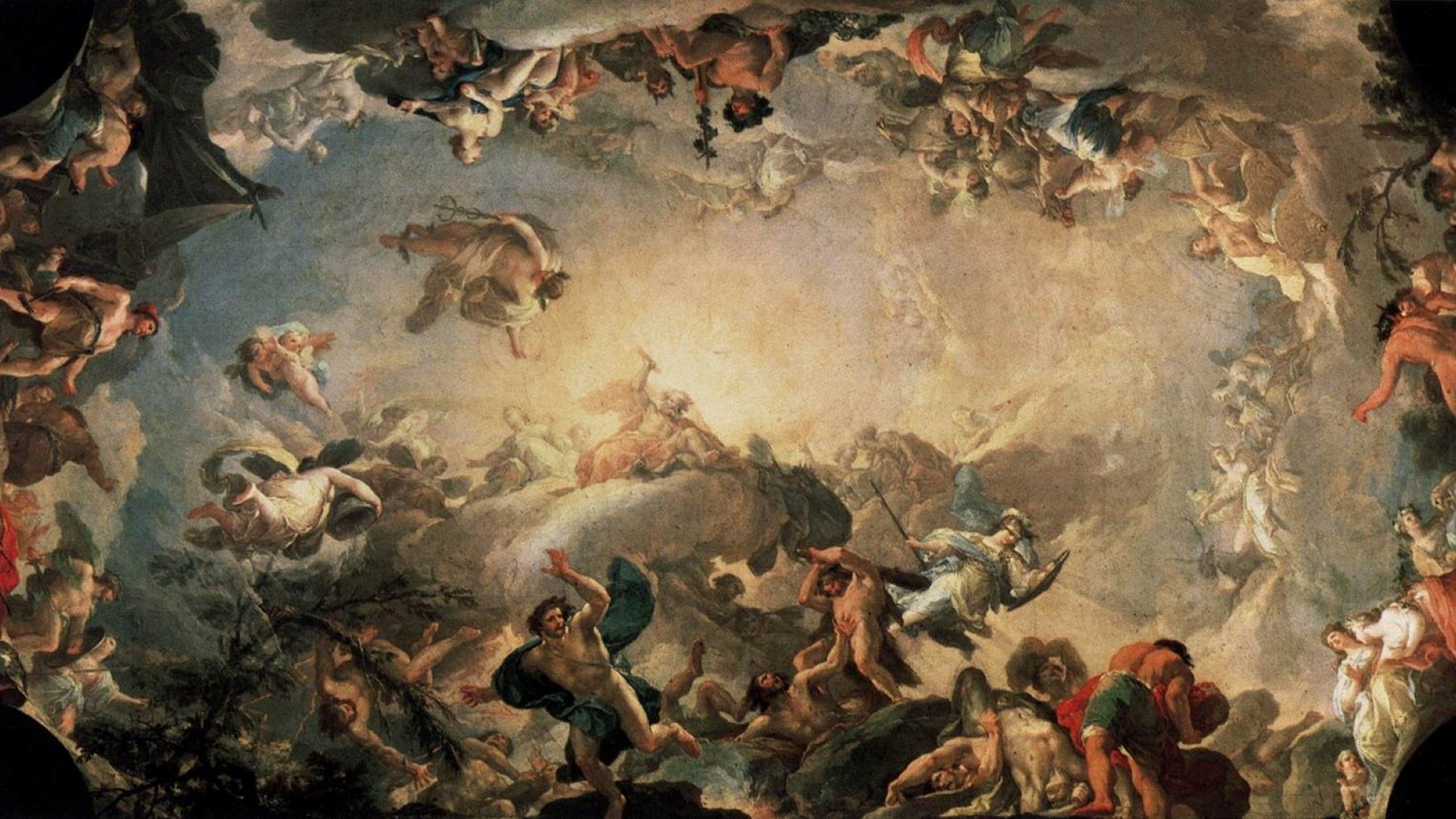
Hecuba or Hecabe
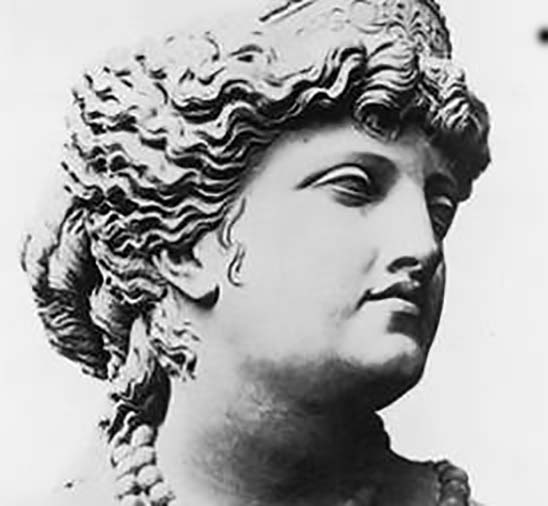
Hecuba or Hecabe (Ancient Greek: Ἑκάβη) was a queen in Greek mythology, the wife of King Priam of Troy during the Trojan War.
She had 19 children, who included major characters of Homer's Iliad such as the warriors Hector and Paris and the prophetess Cassandra.
Two of them, Hector and Troilus are said to have been born as a result of Hecuba's having made love with the god Apollo.
Ancient sources vary as to the parentage of Hecuba. According to Homer, Hecuba was the daughter of King Dymas of Phrygia, but Euripides and Virgil write of her as the daughter of the Thracian king Cisseus.
The mythographers Pseudo-Apollodorus and Hyginus leave open the question which of the two was her father, with Pseudo-Apollodorus adding a third alternative option: Hecuba's parents could as well be the river god Sangarius and Metope.
Some versions from non-extant works are summarized by a scholiast on Euripides' Hecuba: according to those, she was a daughter of Dymas or Sangarius by the Naiad Euagora, or by Glaucippe the daughter of Xanthus; the possibility of her being a daughter of Cisseus is also discussed.
A scholiast on Homer relates that Hecuba's parents were either Dymas and the nymph Eunoe or Cisseus and Telecleia; the latter option would make her a full sister of Theano, which is also noted by the scholiast on Euripides cited above.
According to Suetonius in The Twelve Caesars, the emperor Tiberius pestered scholars with obscure questions about ancient mythology, with one of his favorites being: "Who was Hecuba's mother?"
King Priam himself may have fathered as many as 68 sons, and a further 18 daughters.
The story of Hecuba takes place before, during, and after the Trojan War, and includes a number of battles and encounters with the gods.
Omens of Destruction
Hecuba’s pregnancy with Paris would prove to be a restless one and reached a climax with the advent of a prophetic dream. In this dream, rather than giving birth to a normal baby, she brought forth a fiery torch covered in snakes. She sought out the prophets of Troy to interpret this dream, and they revealed that it was a troubling omen. The omen predicted that if her child lived, he would be responsible for the fall and destruction of Troy.
Hecuba could not bear this news and as Paris was being born, she ordered two of her servants to kill him. The servants were unable to murder a helpless baby, however, and instead left Paris on the side of a mountain to be taken by wild beasts. But a shepherd soon found Paris and raised him as his own son. Many years later, Paris returned to Troy and began the Trojan War by stealing Helen, wife of King Menelaus, from Sparta.
Since all the rulers of Greece had sworn to defend Helen, they declared war on Troy, sacking and burning the city and thus fulfilling the prophecy in a siege of ruin and flame.
The Libation Cup
Hecuba’s involvement in the Trojan War included advice from her son Hector when he returned to the city. She offered the libation cup to him, urging him to make an offering to Zeus and also to drink from it himself. Hector went on to advise his mother to make a deal with Athena, in which she would offer a gown from Alexander’s treasure to the goddess in exchange for help.
The gown in question was beautifully embellished with embroidery, glittering like a star whenever it caught even a hint of light. The gown had been brought back from Sidon when Alexander sailed the seas and was the work of Sidonian women; and leads the Trojan women to the temple of Athena to pray for help.
But Hecuba’s efforts went unanswered. In one final attempt, Hecuba pleaded with Hector not to confront Achilles, but he would not hear of it.
That evening, Hector dueled with Achilles, and met his death. When Hecuba later heard of Priam’s plan to retrieve Hector’s body from Achilles’ camp, she became anxious at the thought of losing both a husband and a son in the same day. Hecuba lamented Hector’s death in a great speech, for he was the dearest of all her children.
Further along in the same episode, at 24.287–98, she offers Priam the libation cup and instructs him to pray to Zeus so that he may receive a favourable omen upon setting out towards the Achaean camp. Unlike in the first episode in which Hector refuses her offer of the cup, Priam accepts and is rewarded with the requested omen. Finally, she laments Hector's death in a well-known speech at 24.748–59.
Apollo and Troilus
Hecuba would later have a child with Apollo, and another prophecy was made: if Troilus were to live until he was 20 years of age, Troy would not fall, despite the previous prophesy. But Achilles waited in ambush while Troilus was riding his horse near a well at the front of the city.
Troilus fled to the temple of Apollo, and was slain at the altar and then dragged by his own horses, sealing the fate of the city to doom and ruin in fulfillment of the omen.
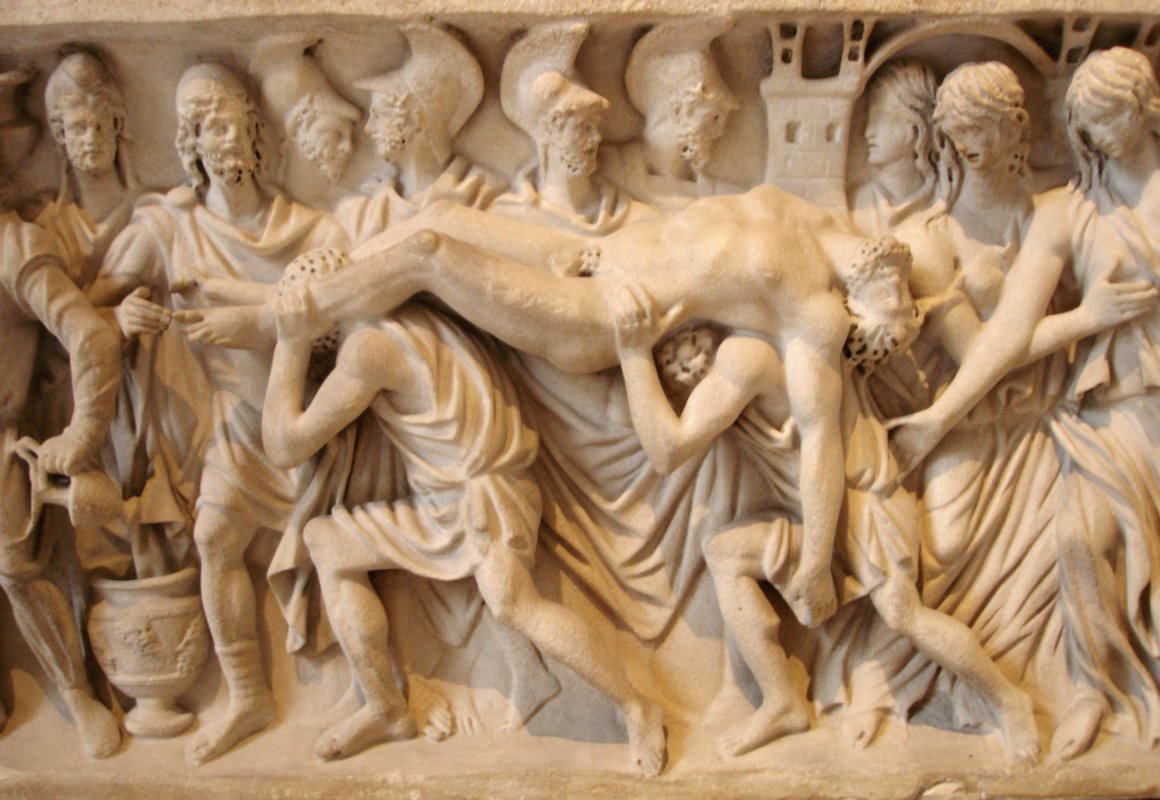
Hecuba in the Iliad
Hecuba appears six times in the Iliad. In Book 6.326–96, she meets Hector upon his return to the polis and offers him the libation cup, instructing him to offer it to Zeus and to drink of it himself. Taking Hector's advice, she chooses a gown taken from Alexander's treasure to give as an offering to the goddess and leads the Trojan women to the temple of Athena to pray for help.
In Book 22, she pleads with Hector not to fight Achilles, expressing her premonition of "never get[ting] to mourn you laid out on a bier." In Book 24.201–16, she is stricken with anxiety upon hearing of Priam's plan to retrieve Hector's body from Achilles' hut.
Further along in the same episode, at 24.287–98, she offers Priam the libation cup and instructs him to pray to Zeus so that he may receive a favourable omen upon setting out towards the Achaean camp. Unlike in the first episode in which Hector refuses her offer of the cup, Priam accepts and is rewarded with the requested omen. Finally, she laments Hector's death in a well-known speech at 24.748–59.
Hecuba's Fate
Hecuba herself would survive the sacking of Troy, by which time only Helenus, who had previously departed from Troy, Polyxena, Cassandra, and potentially Laodice, were still alive.
Hecuba, like Cassandra, Andromache and other women of Troy would become prisoners of the Achaean forces, and Hecuba was given to Odysseus as his share of the spoils of war.
There was still more heartache for Hecuba though, for she would witness the sacrifice of her youngest daughter Polyxena, upon the tomb of Achilles. For it was said that her sacrifice was called for by the ghost of Achilles, and that her death might give the Achaean fleet fair winds home, just as the sacrifice of Agamemnon's daughter, Iphigenia, was said to have brought fair winds to Troy.
Hecuba vs. King Polymestor
It was said that on the same day as the sacrifice of Polyxena, the body of Polydorus, the youngest son of Hecuba, washed up upon the beach near to the Achaean camp.
Hecuba and Priam had sent their youngest son to Thrace to ensure his survival, with care of Polydorus given to King Polymestor.
It was said though, that Polymestor had killed Polydorus when he heard that Troy had falled, possibly to gain friendship from the Achaeans and possibly to gain the Trojan treasure that had accompanied Polydorus to Thrace.
Hecuba sent a message to Polymestor asking the king to come to Troy, with the promise of revealing where the rest of the Trojan treasure was hidden; Hecuba of course not revealing that she knew Polymestor had killed her son.
Agamemnon knew full well what Hecuba was doing, and provided a clear route for her messenger, Agamemnon being in a convivial mood, for Hecuba's daughter Cassandra, was now the Mycenaean king’s concubine.
Thus Polymestor came to Troy and now, perceived as an Achaean ally, entered Hecuba's tent, there Polymestor and his two sons were in the midst of a number of Trojan women, and suspecting no trap, Polymestor let his guard down. Then, the women drew daggers, and killed the two sons of Polymestor, and whilst the king of Thrace was held down, Hecuba stabbed out his eyes.
Agamemnon though refused to punish Hecuba for her, and the other Trojan women’s actions, for he saw it a just punishment for the murder of Polydorus, who had been taken in for safekeeping.
Slavery and Hecuba's End
As if she had not been through enough trials already, Hecuba would be taken prisoner by, and then become a slave to, Odysseus. Before the Trojan War, Odysseus had journeyed through Thrace, where Hecuba had asked its ruler, King Polymestor, to protect her son Polydorus.
When the Greeks reached the Thracian Chersonese on their way home, Hecuba discovered that Polymestor had betrayed her trust and killed Polydorus. When she saw her son lying there lifeless, she went mad and, in a fit of rage, tore out Polymestor’s eyes and killed his sons.
As Odysseus tried to stop her, she was transformed into a dog by the gods so that she could escape. She was never seen again, until her death when she threw herself into the sea. Her tomb could be found on a rocky outcrop, the Hellespont between Greece and Turkey, and would become an important landmark for sailors.
Another story says that when she was given to Odysseus as a slave, she snarled and cursed at him, so the gods turned her into a dog, allowing her to escape.
In another tradition, Hecuba went mad upon seeing the corpses of her children Polydorus and Polyxena. Dante (Inferno XXX: 13–20) described this episode, which he derived from Italian sources:
And when fortune overturned the pride
of the Trojans, who dared everything, so that
both the king and his kingdom were destroyed,
Poor wretched captured Hecuba,
after she saw her Polyxena dead
and found her Polydorus on the beach,
was driven mad by sorrow
and began barking like a dog...
Finally, Stesichorus states that after the sack of Troy, Apollo, Hecuba's former lover, took her to safety and placed her in Lycia.
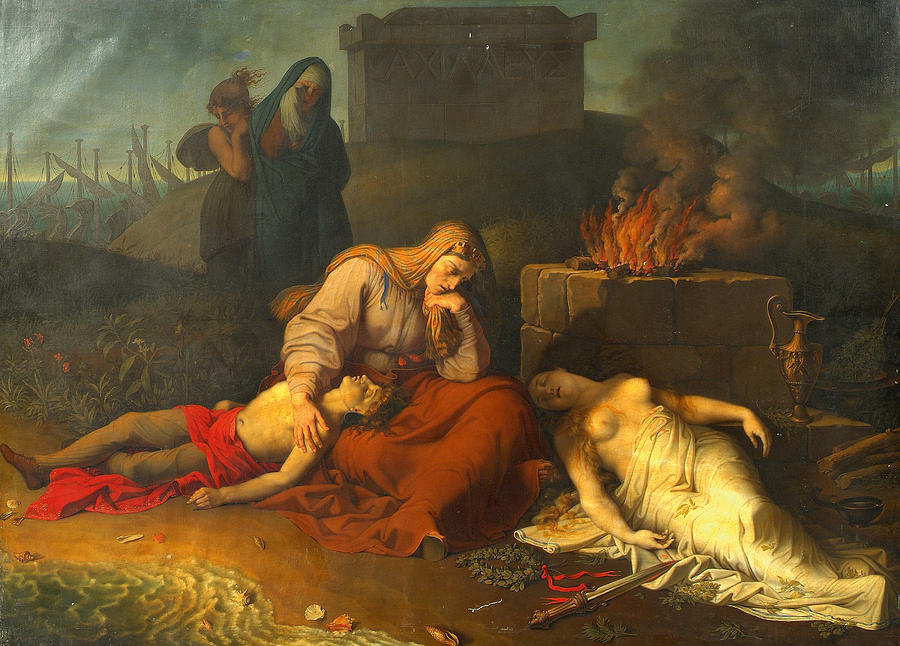
The Fate of Hecuba's Children
After the arrival of the Achaean forces at Troy, Hecabe would witness the death of most of her children, her grandchildren, and her husband during the ten years of fighting and the sacking of Troy.
Antiphus – killed by Agamemnon during the war
Hector – killed by Achilles during war
Troilus – killed by Achilles during war
Hipponous - killed by Achilles during the war (last Trojan killed by Achilles)
Paris – killed by Philoctetes during war
Deiphobus – killed by Menelaus during Sack of Troy
Polites – killed by Neoptolemus during Sack of Troy
Pammon – killed by Neoptolemus during Sack of Troy
Polydorus – killed by Polymestor in Thrace as Troy falls
Helenus – survives war, becomes Greek king of Epirus, and weds Andromache
Laodice – potentially survives war and set free, or else disappears into a divinely created chasm
Creusa – dies during Sack of Troy as unable to keep up with Aeneas
Polyxena – sacrificed upon the tomb of Achilles
Cassandra – becomes concubine of Agamemnon, and killed upon arrival in Mycenae.
Priam himself was killed by Neoptolemus, having strapped on his old armour for one last battle, despite the pleadings of Hecabe to seek sanctuary in one of Troy’s temples.
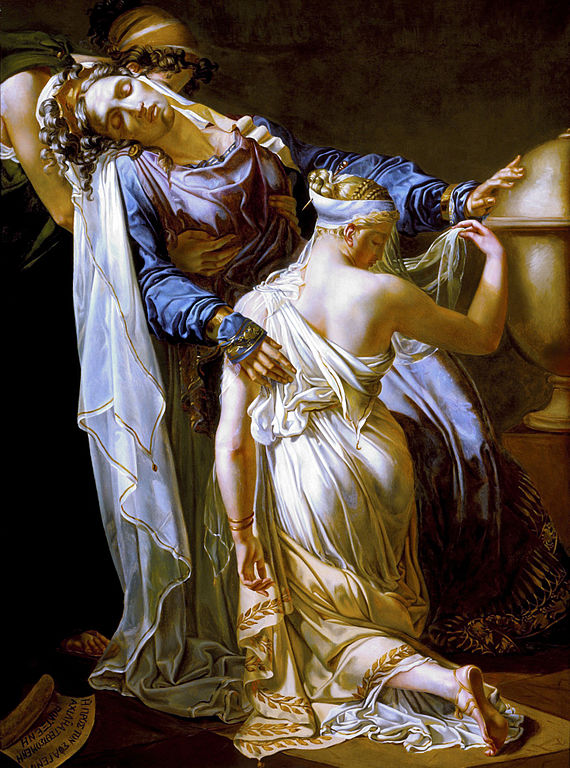
Sources
Stesichorus, Fr. 108; Tzetzes, On Lycophron; Porphyry in his Omissions states that Ibycus, Alexander, Euphorion and Lycophron all made Hector the son of Apollo
Pseudo-Apollodorus, Bibliotheca 3. 12. 5 & E3. 32
Iliad, 16. 715
Euripides, Hecuba, 3
Virgil, Aeneid 7. 320; 10. 705,
Pseudo-Apollodorus, Bibliotheca, 3. 12. 5
Hyginus, Fabulae, 91, 111, 249
Scholia on Euripides, Hecuba, 3
Scholia on Iliad, 16. 718, referring to Pherecydes and Athenion for the two versions respectively
Suetonius, The Twelve Caesars, Chapter 2 (Tiberius), paragraph 72
Homer, The Iliad. Book 22, line 86
Stesichorus, Fr.109
Virgil, Aeneid III.19–68
Homer, Iliad XIV.717–718
Solinus, De vita Caesarum X.22
Lactantius, Divinae institutions I.22
Pomponius Mela, De chorographia II.26
Ovid, Metamorphoses XIII.423–450, 481–571
Euripides, Trojan Women
Euripides, Hecuba
Tsotakou-Karveli. Lexicon of Greek Mythology. Athens: Sokoli, 1990.
Pseudo-Apollodorus, Bibliotheca 3.12.5
Hyginus, Fabulae 90
Photius, Bibliotheca 190.37
"Wikipedia"
"Mythology net"
"Greek Legends and Myths"
Our Mobile Application
Check out Our Mobile Application "Ancient Greece Reloaded"


